|
|
|
Sort Order |
|
|
|
Items / Page
|
|
|
|
|
|
|
| Srl | Item |
| 1 |
ID:
165741
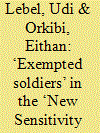

|
|
|
|
|
| Summary/Abstract |
In recent decades (the ‗post-heroic‘ condition) - threats of widespread selective conscientious objection have become a political tool to advance opposing political agendas in Israel. This article examines attitudes amongst the Israeli public concerning the legitimacy of demands that different groups of soldiers be exempted from military operations to which they are ideologically opposed (such as serving in the occupied territories or, conversely, participating in evacuation of settlements). The results point to a multi-cultural model embracing diversity management not as a neo-liberal ideal but rather as a strategy for co-option, containment and inclusion, with a view to preserving the “people's army” model.
|
|
|
|
|
|
|
|
|
|
|
|
|
|
|
|
| 2 |
ID:
067253
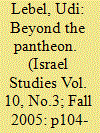

|
|
|
| 3 |
ID:
131978
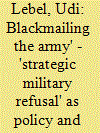

|
|
|
|
|
| Publication |
2014.
|
| Summary/Abstract |
The study shows how 'strategic military refusal' in Israel developed as a rational and institutional means to influence security policies. As opposed to the perspective that sees military refusal as a spontaneous individual act, the study illustrates how organizations operate to distribute military refusal in order to pressure decision-makers to change their military policies. This strategy has proven to be effective when the military is involved with groups that threaten it with refusal - which threatens the military's operational ability and its official and apolitical image. These include soldiers whose civilian authorities, rather than their military commanders, are perceived as an epistemic authority regarding security issues. The case study refers to the impact of strategic military refusal in Israel on security policies and the military doctrine. This was influenced by leftist groups, which, although they belonged to the parliamentary opposition, had dominant presence in the military ranks. Furthermore, the study examines the effect of the use of strategic military refusal on the model of military recruitment.
|
|
|
|
|
|
|
|
|
|
|
|
|
|
|
|
| 4 |
ID:
183497
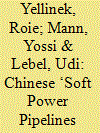

|
|
|
|
|
| Summary/Abstract |
The article examines China’s ‘soft power’ invested in Middle Eastern countries from 2000 to 2018 by offering three main ‘Soft Power Pipelines Diffusion’ (SPPD): the media, popular culture and education. The paper focuses not only on China’s soft presence but also on the response and reception of its power in Middle Eastern Arab countries. China’s soft power presence and efforts were found to be efficient and to contribute to China’s image in the region and to its transformation into an attractive destination for cooperation in many soft areas.
|
|
|
|
|
|
|
|
|
|
|
|
|
|
|
|
| 5 |
ID:
175699
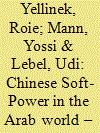

|
|
|
|
|
| Summary/Abstract |
Confucius Institutes are one of the major ways China invests Soft-Power in the world. This paper will examine the Confucius Institutes in universities in Arabic speaking countries from 2006 to 2020. It will focus on the response and reception of China’s Soft-Power in these countries. An initial index for examining the success of these institutes will be offered, which can also be applied to educational-cultural institutes in general. The following review and analysis of data point to the conclusion that Confucius Institutes, as a tool of Chinese Soft-Power, have effectively penetrated the Arab world and are welcomed without significant criticism.
|
|
|
|
|
|
|
|
|
|
|
|
|
|
|
|
| 6 |
ID:
073101
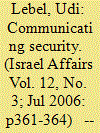

|
|
|
| 7 |
ID:
081006
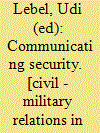

|
|
|
|
|
| Publication |
London, Routledge, 2008.
|
| Description |
x, 239p.
|
| Standard Number |
9780415373401
|
|
|
|
|
|
|
|
|
|
|
|
Copies: C:1/I:0,R:0,Q:0
Circulation
| Accession# | Call# | Current Location | Status | Policy | Location |
| 053157 | 322.5095694/LEB 053157 | Main | On Shelf | General | |
|
|
|
|
| 8 |
ID:
073107
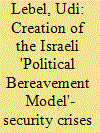

|
|
|
| 9 |
ID:
149187
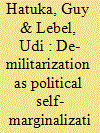

|
|
|
|
|
| Summary/Abstract |
In the elections for the 19th and 20th Knesset, the Labor Party fared badly. The party list for these two election campaigns was almost completely devoid of ‘bithonistim’ – members of the Israeli security elite (MISEs). The article examines the placement of MISEs on the Labor Party list from 1977 up until the 2015 elections. It shows how, from the establishment of the state, the Labor Party was the natural home of MISEs, thereby becoming the dominant party with regard to the Israeli agenda, in which military and security issues occupy a central place. The decrease in the number of MISEs on the Labor list, and their replacement with Member of parliament who are associated more closely with civil issues, have marginalized the Labor Party in relation to the public agenda. The article shows how in Israel, a society organized around cultural militarism, the party’s demilitarization has led to political marginalization.
|
|
|
|
|
|
|
|
|
|
|
|
|
|
|
|
| 10 |
ID:
167151
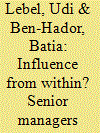

|
|
|
|
|
| Summary/Abstract |
The article examines whether or not senior managers in public administration who belong to the Religious-Zionist community operate as effective Policy Injection Agents – adopting the ‘Influence from within’ ethos that makes them a part of a policy community – or whether they perceive this discourse in another way. Thirty-five interviews with senior public administrators pertaining to the Religious-Zionist community were analysed based on the principles of Critical Discourse Analysis. A number of central themes were identified, the vast majority of which point to the ‘Influence from within’ ethos not becoming a component in the managerial identity of the interviewees and their colleagues. While it served them within their community as legitimation for attending general society to study, live and work outside the base of Religious-Zionism, from the moment they integrated in the public system – their concern became the exact opposite of the ethos: not to be perceived by their secular colleagues as part of a sector but as professional individuals who are exclusively committed to the professional ethos of their managerial community.
|
|
|
|
|
|
|
|
|
|
|
|
|
|
|
|
| 11 |
ID:
163283
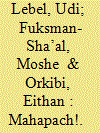

|
|
|
| 12 |
ID:
120361
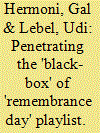

|
|
|
|
|
| Publication |
2013.
|
| Summary/Abstract |
This article examines the musical repertoire broadcast on Israeli state radio stations on Remembrance Day. Commencing with the first Remembrance Day, Israeli radio stations have refrained from broadcasting songs that do not contribute to the glorification of the military mythology or failure to reinforce the consensual perception of national loss. In view of globalization - it might be assumed that Remembrance Day songs would undergo changes in tune with the times. From a musical point of view, new songs that belong to what Regev and Seroussi classify as 'globalizing Israel' penetrated into the nationalist arena. But, following Inglehart and Baker, these songs, despite their seemingly secular façade, remain limited hegemonic enclosures organized around the core of founding values. Apparently, this is an example of the process of glocalization of culture. The article seeks answers to the strategies employed to accommodate these new songs to the traditional ideology of the classical Remembrance Day songs and examines whether the mechanisms of legitimacy that enable the inclusion of new voices on Remembrance Day, can be identified. We argue that their choice is not arbitrary and that they illustrate the manner by which voluntary cultural entrepreneurs (musical editors) are co-opted in the postnational condition.
|
|
|
|
|
|
|
|
|
|
|
|
|
|
|
|
| 13 |
ID:
139243
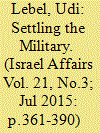

|
|
|
|
|
| Summary/Abstract |
The article describes the establishment of the pre-military academies in Judea and Samaria as cultural agents preceding the militaristic habitus of these areas. It follows the development of the security epistemic community in these areas which formed a new identity of the settlers. The increase of religious-Zionist youth in combat units and officer courses in the IDF due to these academies altered the positioning of the settlers and all religious Zionists in Israeli society vis-à-vis non-religious elites, the ultra-orthodox, and religious-Zionist groups who did not join the pre-military academy revolution. Judea and Samaria became a ‘security zone’ identified with sacrifice, heroism, giving, a pedagogical partnership with the army, reflected in higher percentages of activities in educational, religious, and cultural institutions encouraging meaningful army service.
|
|
|
|
|
|
|
|
|
|
|
|
|
|
|
|
| 14 |
ID:
192900
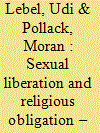

|
|
|
|
|
| Summary/Abstract |
Following Zygmunt Bauman’s concept of ‘Liquid Modernity’, the term ‘Liquid Authenticity’ is ascribed to a community that holds a type of identity known in Israel as ‘traditional’ and does not purely conform with either the secular or religious identity categories. This concept is examined through an ethno-phenomenological study of female university students who identify with this category and go out on numerous dates through dating apps. These women proclaim a sexual liberation discourse on the one hand, while declaring that they are non-liberal and aspire towards having a traditional family and a Jewish traditional lifestyle. They see no contradiction between their sexual rhetoric, 'erotic capital' and their Jewish-traditional-religious core identities. The article's main argument is that the category to which these women belong is one of many emerging categories in Israeli society that are characterized by ”Liquid Authenticity”: a form of authenticity expressing a cooptation of discourses towards identity-based ethoses and cores. At first glance a feminization of the religious discourse may be suspected, but as illustrated it is rather a cooptation of liberal language and practices into a religious-traditional identity. Similar ”liquid authenticity” configurations can be noted among additional discourse communities and specifically political communities in Israel.
|
|
|
|
|
|
|
|
|
|
|
|
|
|
|
|
|
|
|
|
|